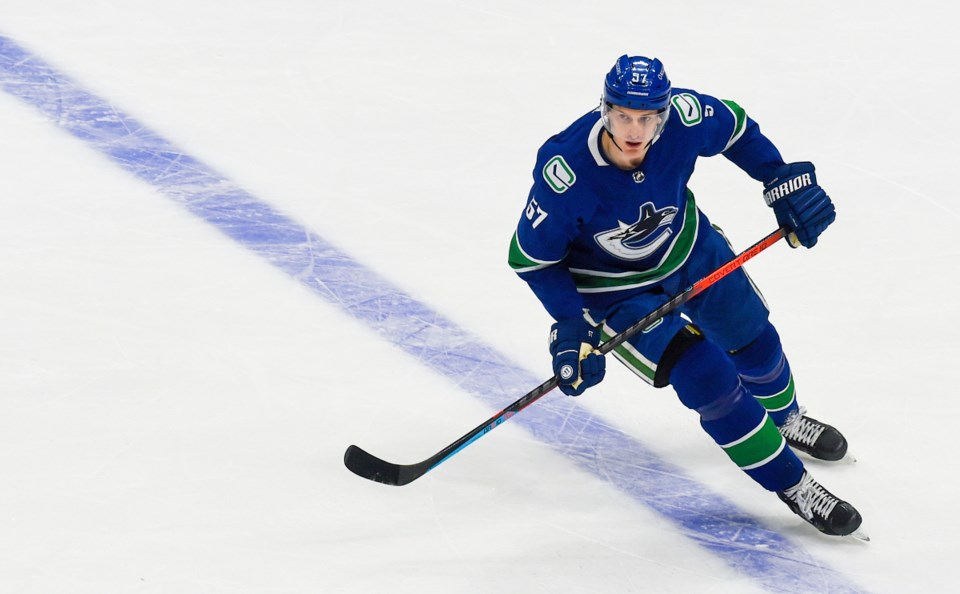The Â鶹´«Ã½Ó³»Canucks have a problem.
Well, they have several problems, but one overarching problem is making it difficult to address the other problems: they don’t have any cap space.
In fact, the Canucks started the season with exactly zero dollars in cap space. That was a good thing in one sense; it meant they could maximize their cap relief when they put players on long-term injured reserve. On the other hand, it also means they’re right up against the salary cap, which limits their flexibility and makes it difficult to make moves to improve the team.
The Canucks tried to clear cap space in the offseason but, by their own admission, found it a lot harder than they expected.
“We haven’t cleared as much cap space as we would have liked to,” said Canucks president Jim Rutherford early in the summer. “We’ll look for complementary players and build more depth and things like that but we’re not in the position that we had hoped to be at this point in time.”
That inability to clear cap space limited what they could do. For instance, the Canucks wanted to trade for Ethan Bear long before it actually happened but couldn’t make the money work.
“We finally were able to get Ethan Bear,” . “We worked at that deal for a few months but we didn't have the cap space and finally got creative enough that we could do it.”
A big part of the problem is the amount of cap space tied up in two veteran players who are past their prime and contributing far less than their cap hit: Oliver Ekman-Larsson and Tyler Myers.
Ekman-Larsson's contract is a huge problem and the biggest reason why it was a mistake to acquire Ekman-Larsson at any price, let alone for the first-round pick that was sent to the Arizona Coyotes as part of the deal. He’s signed through 2027 and it would take a miracle to find another team willing to take on that contract.
Myers, on the other hand, is only signed through 2024 and might still have some value to other teams.
According to , one of those teams is the Ottawa Senators. He reported that a Myers trade was discussed between the Canucks and Senators.
“I do think [Ottawa] and Â鶹´«Ã½Ó³»talked about a Tyler Myers, Nikita Zaitsev-type trade,” said Friedman. “I don’t think it ever got to Myers. My buddy, Rick Dhaliwal, reported that [Myers] didn’t turn down a trade — I don’t think it ever got to him.”
Myers has a modified no-trade clause, with a ten-team no-trade list. If Ottawa was on that list, he would have to be consulted about a potential trade and approve it before a deal could get done.
If the deal never got to Myers, that means one of two things. One is that the deal just never developed — maybe neither side could agree to the particulars and the trade talks came to an end.
The other possibility is that Zaitsev turned down the trade.
Zaitsev is a similar player to Myers in many ways, including a contract that goes through 2024, albeit with a $4.5 million cap hit instead of Myers’ $6 million cap hit. He’s fallen out of favour with the Senators thanks to his inconsistent, defensively-questionable play. He was a frequent healthy scratch this season before being waived and sent down to the AHL with the Belleville Senators.
The benefits to both the Canucks and Senators are immediately evident. Myers would give the Senators a defenceman they could actually play and would provide an upgrade on Travis Hamonic on the Senators’ top-four.
For the Canucks, swapping Myers for Zaitsev would give the Canucks an extra $1.5 million in cap space this season and next season — $2.625 million if they kept Zaitsev in the AHL.
Only, Zaitsev also has a modified no-trade clause with a ten-team no-trade list. If Â鶹´«Ã½Ó³»was on that list, perhaps he was approached first and said no.
Does that seem likely? Honestly, probably not. Remember, this is a player that cleared waivers and is now in the AHL. Why wouldn’t he jump at the chance to get an opportunity for a fresh start with a new organization, particularly one that already has a few Russian players on the roster?
It seems more likely, then, that the deal just never came together. But perhaps that means it could come together in the future.
“I don’t know where it stands right now or if it could be revived but it was, at some level, discussed,” said Friedman.




